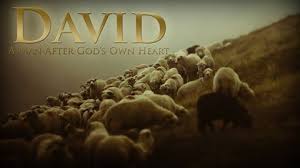David’s Death
First Kings 2:10-11
and First Chronicles 29:26-30
David’s death DIG: How many years did David rule in Hebron over Judah? How many years did he rule all together? Who succeeded him? Was there an official ceremony? Why not? In what sense was David a man after God’s own heart?
REFLECT: If you’ve lived long enough, there are important people in your life that have passed away: father’s, mother’s, sisters, brothers, children, friends. I am sure David was looking forward to see his God, the son that he lost after his sin with Bathsheba, and his friend Y’honatan. Who do you look forward to seeing, and why? What are the most important things you have learned from your study of the Life of David? What will you do in response to what you’ve learned?
970 BC David 70

Then David, son of Jesse was king over all Isra’el, rested with his ancestors and was buried in the City of David. He had made extensive preparations for a successful reign for his son, particularly with regard to the plans and materials for the Temple. Now, having reigned forty years over Isra’el – seven years in Hebron over Judah alone – and thirty-three in Jerusalem, David died at a good old age, knowing that the kingdom was in good hands, having enjoyed a long life, wealth and honor. His son Solomon succeeded him as king. Solomon was already king and his throne was secure, so there was no need for any official decisions or ceremonies. Shavu’ot is the traditional date on which King David died, a point to be remembered when reading Acts 2:25-32 (see the commentary on Acts, to see link click An – Peter Speaks to the Shavu’ot Crowd).
As for the events of King David’s reign, from beginning to end, there are written in the records of Samuel the seer, the records of Nathan the prophet and the records of Gad the seer, together with the details of his reign and power, and the circumstances that surrounded him and Isra’el and the kingdoms of all the other lands (First Chronicles 29:26-30).
The Bible paints a grand picture of David. He was an outstanding person, courageous, generous, warm-hearted, outgoing and appreciative of others. He was a warrior, poet, musician, military genius, and administrator. He was, moreover, a man who inspired loyalty, and with the help of his supporters, accomplished much: the establishment of Jerusalem as Isra’el’s capital, and the uniting of the twelve tribes into a nation that could hold its own in the international scene. Isra’el’s cities had their defenses strengthened, and by the end of David’s reign preparations were in hand for the building of the Temple in Tziyon. All this accounts, in part, for David’s greatness.
In what sense, however, was he a man after God’s own heart (First Samuel 13:14)? He is depicted in the Bible as entirely human, hampered by weaknesses that were the counterpart of his strengths. He had a problem with lust and he was indulgent towards his sons, both of those issues caused him enormous problems. But unlike Sha’ul, when David received a rebuke he humbly admitted his faults; when Nathan or Gad delivered a message of judgment, the prophet’s condemnation was accepted as the word of God. In other words, ADONAI was King; David was merely His proxy, exercising delegated power.
David’s successors, who for the most part failed to conform to this role, were pointed back to him, for whose sake the dynasty was permitted to continue until the kingdom was swept away by the Babylonians (see the commentary on Jeremiah, to see link click Gu – Seventy Years of Imperial Babylonian Rule). Even then, hopes were kept alive by the promise of Nathan to David, “Your house (dynasty) and your Kingdom will endure forever before Me; your throne will be established forever” (First Samuel 7:16). The B’rit Chadashah takes up the theme when Yeshua is introduced as a descendant of David; indeed the very first verse of Mattityahu’s Gospel makes the point: This is the genealogy of Yeshua the Messiah, son of David, son of Abraham (Mattityahu 1:1 CJB).558



Leave A Comment